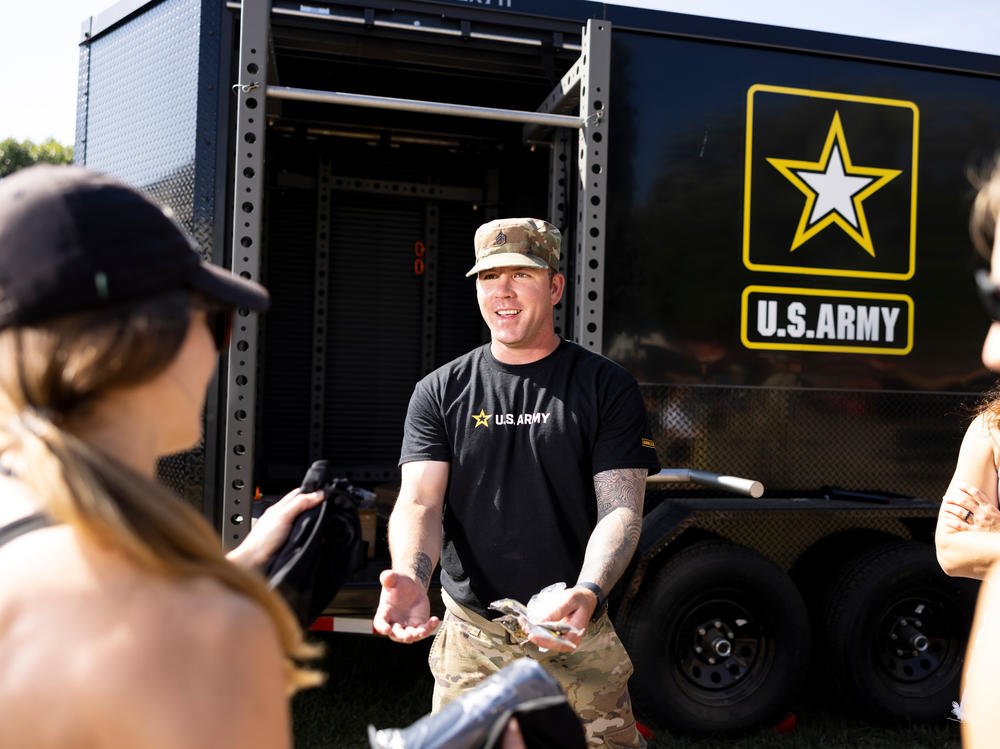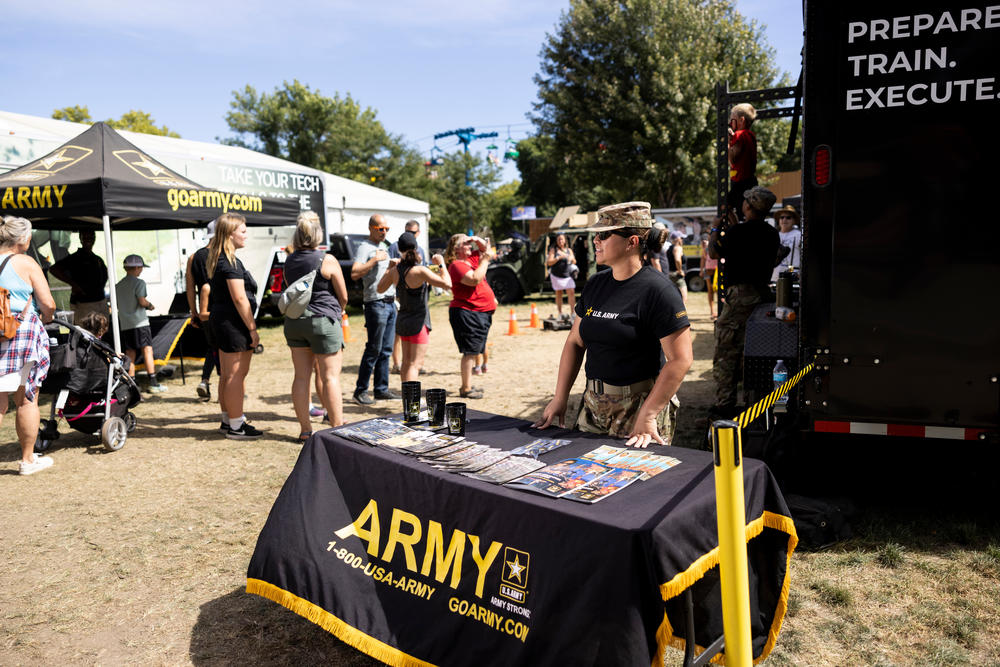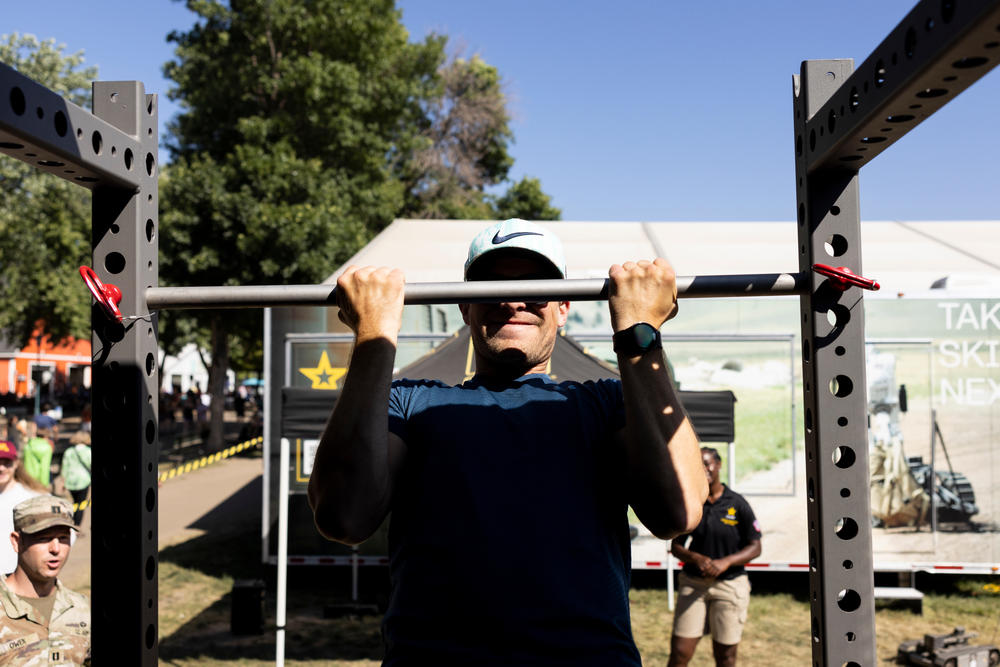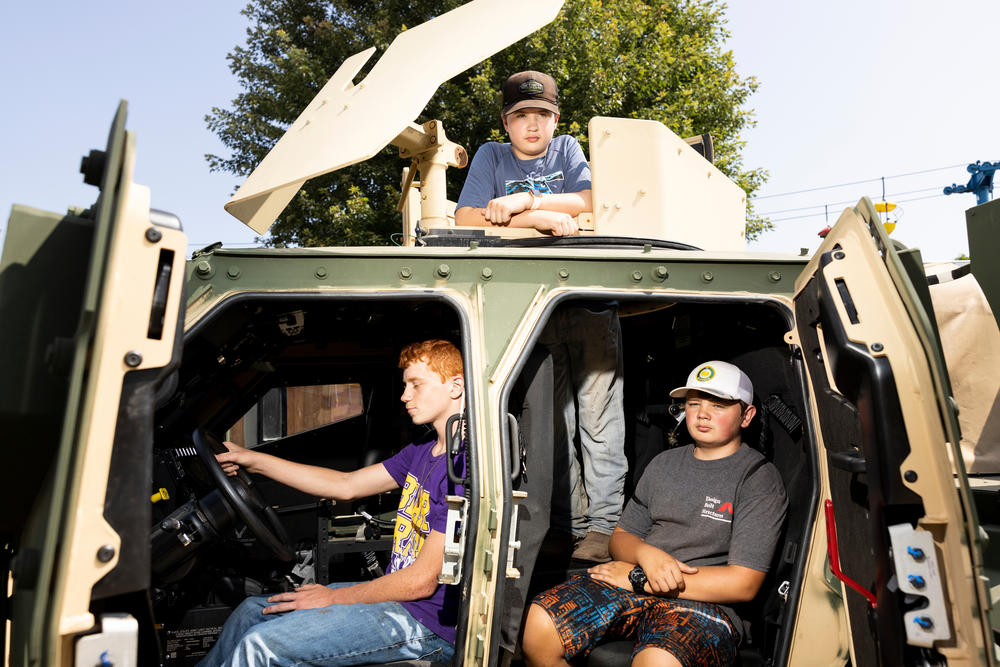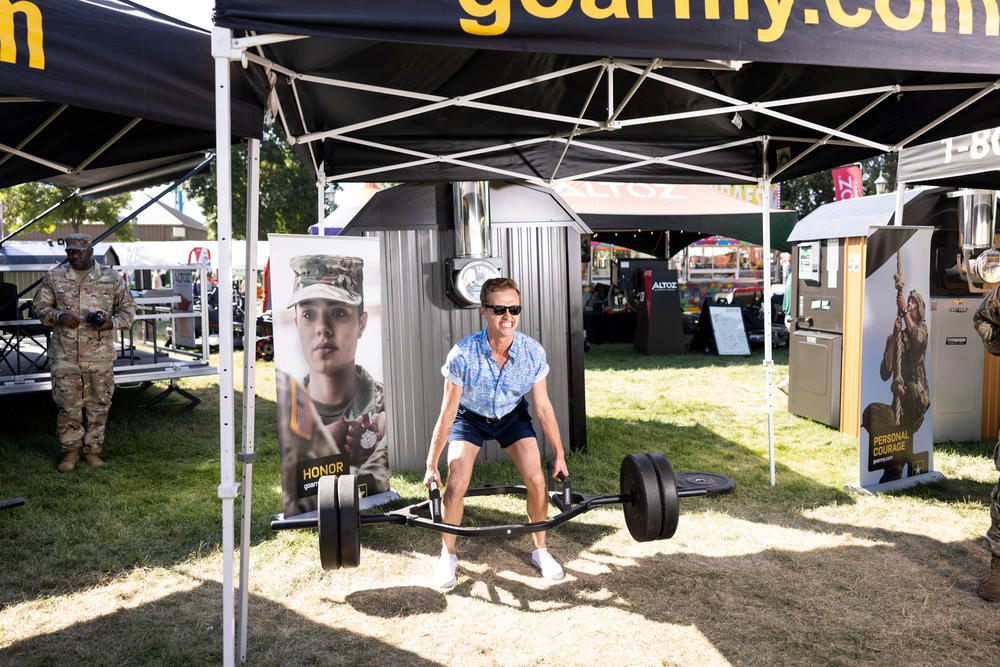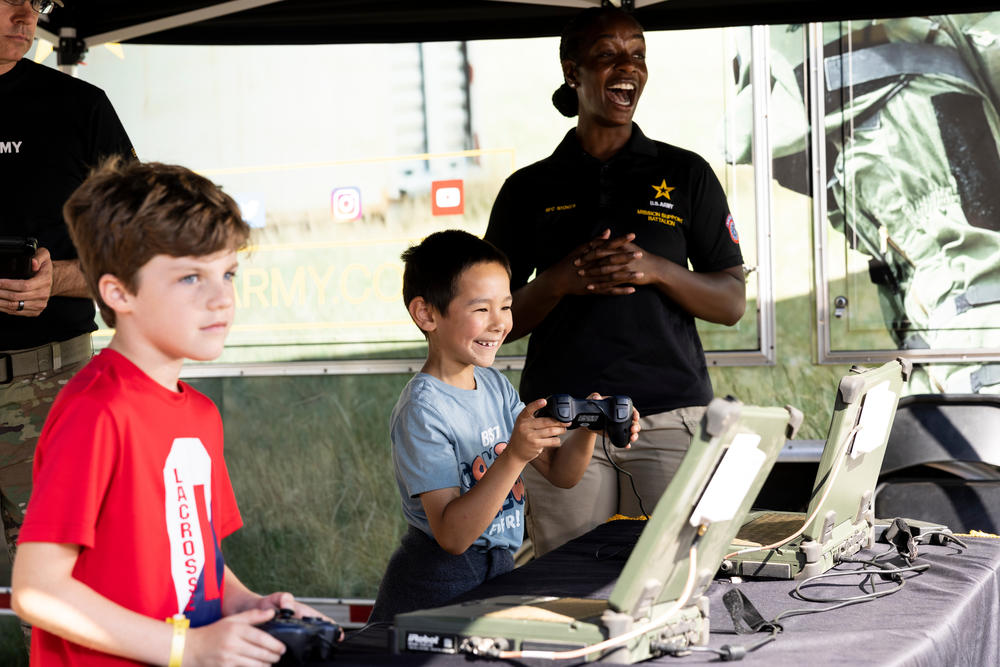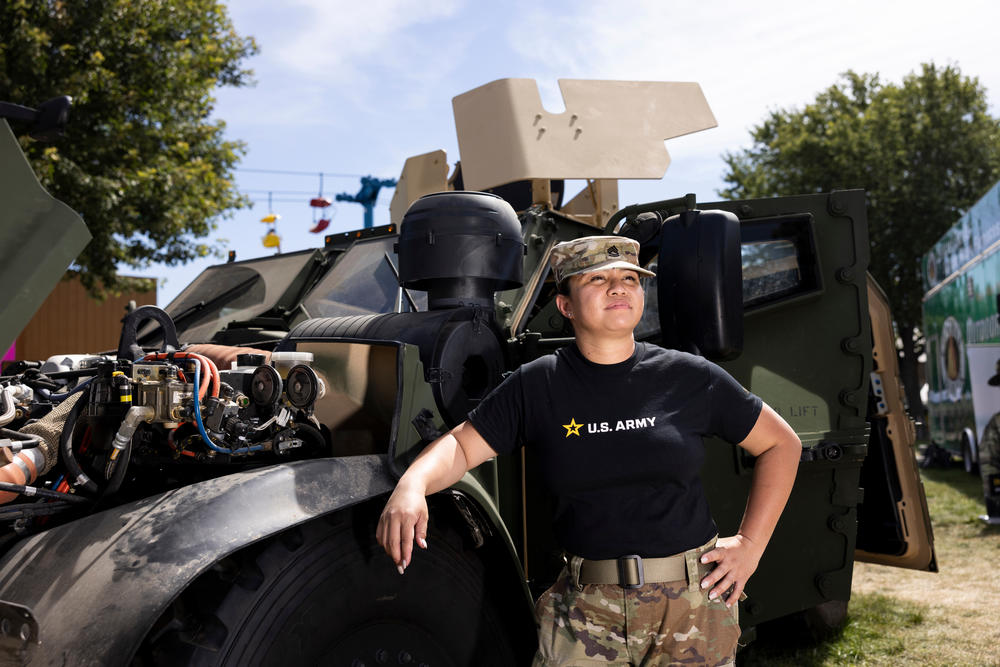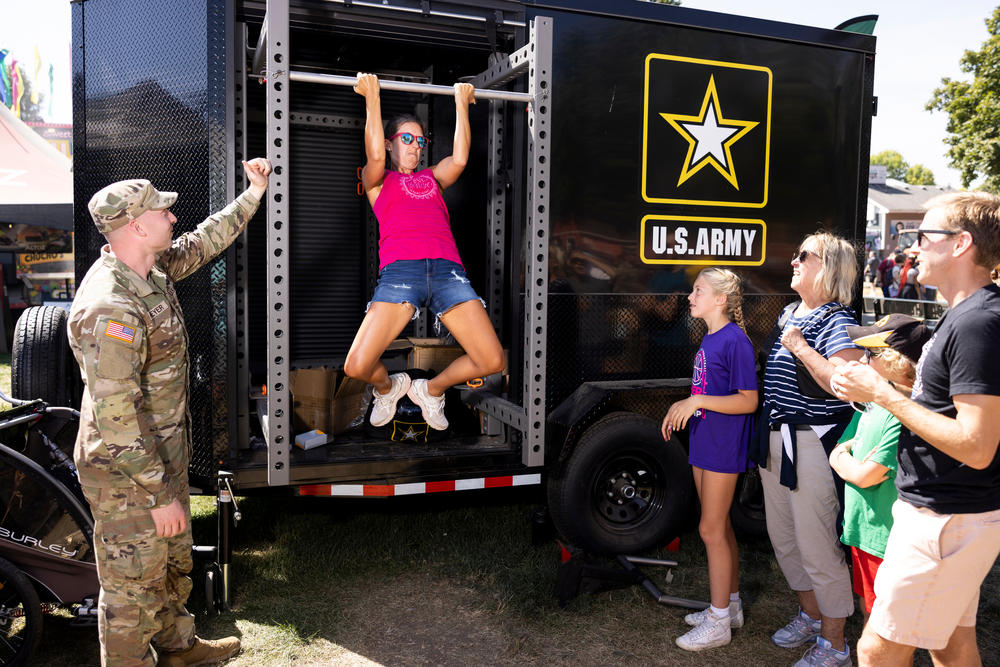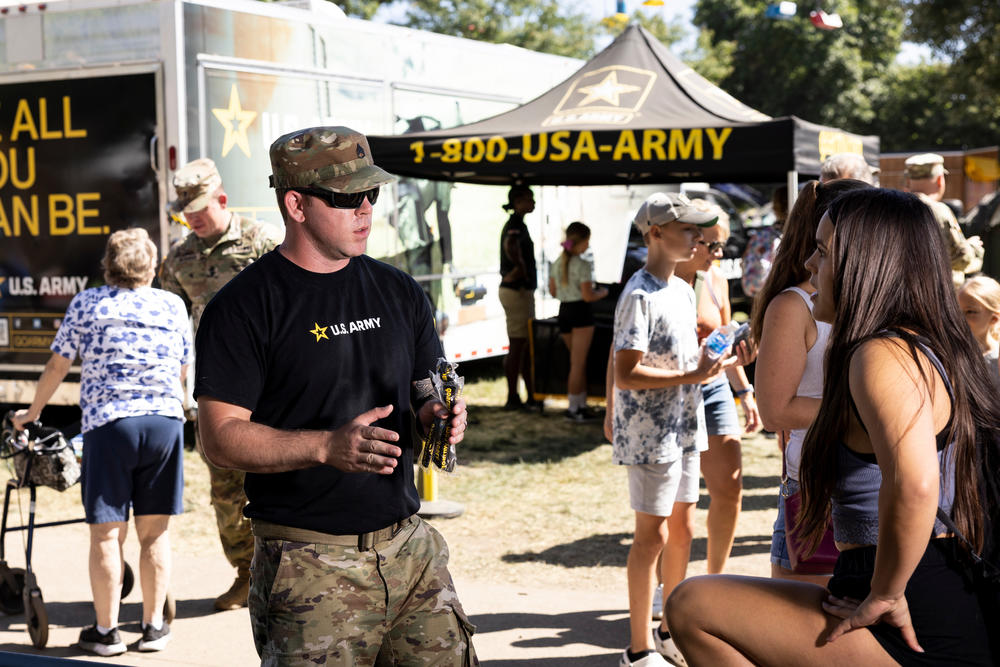Section Branding
Header Content
Who's in the Army now? A pitch switch aims to get more military recruits
Primary Content
St. PAUL, Minn. — Staff Sgt. Joshua Spearman grips the metal bench and eyes the crowd through his dark, wraparound sunglasses. He's a brawny soldier in a black T-shirt, his left arm covered in tattoos.
He's watching the endless stream of humanity flow past him at the Minnesota State Fair. Families with strollers, couples with just-won stuffed animals, elderly fair goers in motorized wheelchairs. Soon he eyes his prey: a cluster of young men. He tosses out his sales pitch.
"Hey! You know what's good? Eating all the fair snacks and come work it off. I'm so serious, dude! Deadlift challenge!"
The guys in the crowd grin at him but shake their heads.
"No? Pull ups? Nothing?" Spearman presses. "Win your girl a T-shirt, man! It's like the ultimate fair story!"
Spearman has his work cut out for him. Because the Army is struggling to fill its ranks. Last year it was 15,000 soldiers short. This year is better but still short by some 10,000. Two big reasons it hasn't met recruitment targets? The Army is in a war for talent with a strong economy offering good jobs and benefits. And the pandemic kept recruiters out of high schools — prime locations for finding future soldiers.
Behind Spearman is a small grass lot with a few pop up canopy tents, a pull-up bar and some weights for dead lifts. A Humvee has its door propped open. It's all designed to lure in prospects.
Finally, college student Andrew Magneson takes the bait. He's a hulking guy with a Minnesota T-shirt and a crown of reddish curls. He nails the deadlift 20 times and gets an Army T-shirt.
But the Army doesn't get him.
"It's not for me," he says. "I know that much. I don't know. I don't like fighting."
And his friends? They're not buying the pitch either.
"So have you guys ever thought about the Army?" asks Sgt. Robert Pederon.
"Not particularly," says one.
"When someone says 'Army' what's the first thing that pops into your head?" he asks them.
"War," says one of the young men.
Pederon pushes on, trying to down play the notion of war, make the Army sound like a regular job, something they can easily fit into their lives.
"There's a part-time option," he says. "You only do the Army one week a month, two weeks during the summer. But we'll pay for your college, room and board."
But they all say, "I'll pass."
Army surveys echo their hesitation. Many don't want to join because they fear getting wounded or killed — even though the wars in Afghanistan and Iraq are long over — or they don't want to leave home. So the Army has come up with a new marketing technique, with an old slogan.
For those who want to join the Army, they may not make the cut
Some say they're at least thinking about the Army, including a 16-year-old high school girl named Alexis who will have to wait a year or two. A recruiter nearby overhears her and swoops in to get her information, including her Instagram handle. Keeping in touch is key.
One senior officer tells NPR the Army is embarking on what he calls a high school "blitz" to find more recruits like her, now that the pandemic is over. Still, officials expect the lagging recruiting climate will continue for sometime. As a result, the Army will likely have to trim its forces in bases around the country.
And they're trying to reel in the next generation, too.
A young boy works a handheld remote under the guidance of a recruiter. He maneuvers a small, tracked Army robot around a series of plastic highway cones, using a monitor to simulate what it's like to control these in the field. The boy is already a pro — it's basically a video game.
It's a clever device, getting the idea in their heads early. Because one thing we heard repeatedly from the young people who were interested: "It's just something I've always wanted to do."
But even if you're ready to sign up, you might not make the cut. A recent Pentagon study found less than one quarter of America's youth would qualify for military service without a waiver, because they're overweight, have criminal records or mental or physical health problems.
So how is the military trying to make up for those lost numbers? They're increasingly turning to who recently arrived in the United States — and hiring more immigrant recruits like Sgt. 1st Class Nouella Lacson to talk to them.
Lacson's family came from the Philippines. She's standing nearby at a card table, covered with brochures, lanyards and dog tags.
"Most of my applicants are immigrants. I kind of relate to them," she says with a laugh. "A lot of them they just got here from Mexico or different countries."
She'll tell them her own story to put them at ease.
"I got here when I was 17," she says, "joined when I was 22," and goes on to talk about how the Army got her through college.
It also helps that she's a woman. She says most of her applicants are female. "I can relate," she says. "Because a lot of people will tell you, you can't do this or that, certain stuff. So I tell them 'Are you going to let people tell what you can and can't do?'"
About 16 percent of the Army is now female, a number that keeps edging up. Women tend to be a higher-quality recruit, score higher on tests and have fewer brushes with the law.
And now all ground combat jobs are open to women, so the Army is pushing that in some of its ads, including a woman spotting a target inside a Abrams tank.
But that all leads to another hurdle in recruiting: Army surveys show some 20 percent of women questioned were wary of joining, saying they'll be discriminated against. Beyond that, sexual harassment and assault are still a persistent problem. Last year, the Army saw a nine percent drop in reports of sexual assault — but the year earlier, there was a 26 percent increase in reports involving soldiers. But Lt. Col. Kristen Grace, who commands all the recruiters, played that down.
"I've never experienced anything like that," she says.
"For me personally, I've never experienced it," says Sgt. Lacson.
But it's still a concern. One possible recruit, Harmony Cook, says her friends are worried about it when she talks about joining the military.
"They say like I'm going to be treated more differently than the guys," she says. "Or like the guys are going to be intimidating and everything and I might not be able to stand a chance."
But she wants to join and become a medic and get a $50,000 bonus.
So far Harmony is one of some 25 potential recruits here who have requested a formal interview, another 750 have asked for more information. Lt. Col. Grace thinks those numbers are pretty good.
The 'tough guy' approach isn't going away
And while the Army is plugging personal development today and service, and playing down combat to attract female recruits, that "tough guy" approach isn't totally going away.
It just depends on who's listening.
Spearman has pulled over college student Landon Arends from Iowa, who says he's leaning toward the Marines because he wants to see some combat. Sgt. Spearman brushes that aside.
"I've had three deployments with a Special Forces group. I've never seen a Marine out there fighting, man," Spearman says in a rapid fire delivery. "They're a force-on-force conflict type people. You want to be in the fight? Our Green Berets are out there in the fight. Our Army Rangers are out there in the fight."
Arends is still reluctant. He's still in college and wrestles.
"But they don't pay you to wrestle," Spearman counters.
Arends tells him he has student loans.
"That sucks man. That sucks real bad," says Spearman, who points to college assistance for those willing to sign up. "I wrote a $214,000 check to a high school girl last year."
As Arends continues to hesitate, Spearman pulls over one of his colleagues, Capt. Tyler Owen, to seal the deal.
"He's also a paratrooper like myself. And he's also an infantry man," Spearman tells Arends. "So this could be your goal."
Spearman just might have another recruit.
"I got you on Instagram," he tells Arends. "You got my number, man. Reach out. Let's make a difference."
As Arends walks away, Spearman turns to Owen.
Once his possible new recruit is out of earshot, Spearman turns to his colleague, smiling. The Ranger insignia, with all its prestige and grit, was helpful.
"Had to flex that f****** Ranger tab off you real quick, sir."
Copyright 2023 NPR. To see more, visit https://www.npr.org.
